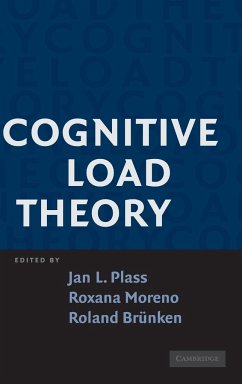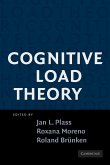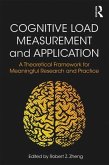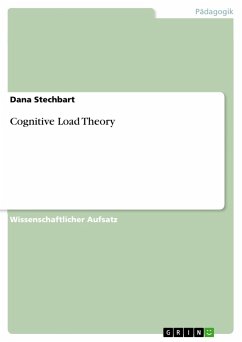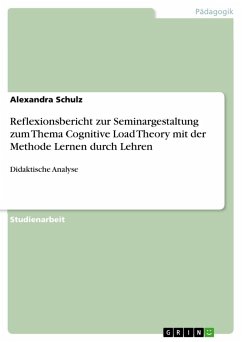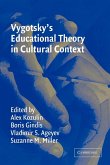Cognitive Load Theory
Herausgeber: Plass, Jan L.; Brünken, Roland; Moreno, Roxana
Cognitive Load Theory
Herausgeber: Plass, Jan L.; Brünken, Roland; Moreno, Roxana
- Gebundenes Buch
- Merkliste
- Auf die Merkliste
- Bewerten Bewerten
- Teilen
- Produkt teilen
- Produkterinnerung
- Produkterinnerung
A comprehensive review of all issues related to cognitive load theory, written by prolific researchers from around the world.
Andere Kunden interessierten sich auch für
![Cognitive Load Theory Cognitive Load Theory]() Cognitive Load Theory42,99 €
Cognitive Load Theory42,99 €![Cognitive Load Measurement and Application Cognitive Load Measurement and Application]() Cognitive Load Measurement and Application62,99 €
Cognitive Load Measurement and Application62,99 €![Cognitive Load Theory Cognitive Load Theory]() Dana StechbartCognitive Load Theory17,95 €
Dana StechbartCognitive Load Theory17,95 €![Reflexionsbericht zur Seminargestaltung zum Thema Cognitive Load Theory mit der Methode Lernen durch Lehren Reflexionsbericht zur Seminargestaltung zum Thema Cognitive Load Theory mit der Methode Lernen durch Lehren]() Alexandra SchulzReflexionsbericht zur Seminargestaltung zum Thema Cognitive Load Theory mit der Methode Lernen durch Lehren17,95 €
Alexandra SchulzReflexionsbericht zur Seminargestaltung zum Thema Cognitive Load Theory mit der Methode Lernen durch Lehren17,95 €![A High-Efficiency Switched Capacitor Point-Of-Load DC-DC Converter A High-Efficiency Switched Capacitor Point-Of-Load DC-DC Converter]() Kunduru HarshiniA High-Efficiency Switched Capacitor Point-Of-Load DC-DC Converter27,99 €
Kunduru HarshiniA High-Efficiency Switched Capacitor Point-Of-Load DC-DC Converter27,99 €![Vygotsky's Educational Theory in Cultural Context Vygotsky's Educational Theory in Cultural Context]() Alex Kozulin / Boris Gindis / Vladimir S. Ageyev / Suzanne M. Miller (eds.)Vygotsky's Educational Theory in Cultural Context92,99 €
Alex Kozulin / Boris Gindis / Vladimir S. Ageyev / Suzanne M. Miller (eds.)Vygotsky's Educational Theory in Cultural Context92,99 €![Vygotsky's Educational Theory in Cultural Context Vygotsky's Educational Theory in Cultural Context]() Alex Kozulin / Boris Gindis / Vladimir S. Ageyev / Suzanne M. Miller (eds.)Vygotsky's Educational Theory in Cultural Context50,99 €
Alex Kozulin / Boris Gindis / Vladimir S. Ageyev / Suzanne M. Miller (eds.)Vygotsky's Educational Theory in Cultural Context50,99 €-
-
-
A comprehensive review of all issues related to cognitive load theory, written by prolific researchers from around the world.
Produktdetails
- Produktdetails
- Verlag: Cambridge University Press
- Seitenzahl: 286
- Erscheinungstermin: 4. Februar 2015
- Englisch
- Abmessung: 235mm x 157mm x 21mm
- Gewicht: 618g
- ISBN-13: 9780521860239
- ISBN-10: 0521860237
- Artikelnr.: 28108592
- Herstellerkennzeichnung
- Libri GmbH
- Europaallee 1
- 36244 Bad Hersfeld
- gpsr@libri.de
- Verlag: Cambridge University Press
- Seitenzahl: 286
- Erscheinungstermin: 4. Februar 2015
- Englisch
- Abmessung: 235mm x 157mm x 21mm
- Gewicht: 618g
- ISBN-13: 9780521860239
- ISBN-10: 0521860237
- Artikelnr.: 28108592
- Herstellerkennzeichnung
- Libri GmbH
- Europaallee 1
- 36244 Bad Hersfeld
- gpsr@libri.de
Introduction Jan L. Plass, Roxana Moreno and Roland Brünken; Part I.
Theory: 1. Cognitive load theory: historical development and relation to
other theories Roxana Moreno and Babette Park; 2. Cognitive load theory:
recent theoretical advances John Sweller; 3. Schema acquisition and sources
of cognitive load Slava Kalyuga; 4. Individual differences and cognitive
load theory Jan L. Plass and Slava Kalyuga; Part II. Empirical Evidence: 5.
Learning from worked-out examples and problem solving Alexander Renkl and
Robert K. Atkinson; 6. Instructional control of cognitive load in the
design of complex learning environments Liesbeth Kester, Fred Paas and
Jeroen J. G. van Merriënboer; 7. Techniques that reduce extraneous
cognitive load and manage intrinsic cognitive load during multimedia
learning Richard E. Mayer and Roxana Moreno; 8. Techniques that increase
generative processing in multimedia learning: open questions for
cognitive-load research Roxana Moreno and Richard E. Mayer; Part III.
Discussion: 9. Measuring cognitive load Roland Brünken, Tina Seufert and
Fred Paas; 10. From neo-behaviorism to neuroscience: perspectives on the
origins and future contributions of cognitive load research Richard E.
Clark and Vincent P. Clark; 11. Cognitive load in learning with multiple
representations Holger Horz and Wolfgang Schnotz; 12. Current issues and
open questions in cognitive load research Roland Brünken, Jan L. Plass and
Roxana Moreno.
Theory: 1. Cognitive load theory: historical development and relation to
other theories Roxana Moreno and Babette Park; 2. Cognitive load theory:
recent theoretical advances John Sweller; 3. Schema acquisition and sources
of cognitive load Slava Kalyuga; 4. Individual differences and cognitive
load theory Jan L. Plass and Slava Kalyuga; Part II. Empirical Evidence: 5.
Learning from worked-out examples and problem solving Alexander Renkl and
Robert K. Atkinson; 6. Instructional control of cognitive load in the
design of complex learning environments Liesbeth Kester, Fred Paas and
Jeroen J. G. van Merriënboer; 7. Techniques that reduce extraneous
cognitive load and manage intrinsic cognitive load during multimedia
learning Richard E. Mayer and Roxana Moreno; 8. Techniques that increase
generative processing in multimedia learning: open questions for
cognitive-load research Roxana Moreno and Richard E. Mayer; Part III.
Discussion: 9. Measuring cognitive load Roland Brünken, Tina Seufert and
Fred Paas; 10. From neo-behaviorism to neuroscience: perspectives on the
origins and future contributions of cognitive load research Richard E.
Clark and Vincent P. Clark; 11. Cognitive load in learning with multiple
representations Holger Horz and Wolfgang Schnotz; 12. Current issues and
open questions in cognitive load research Roland Brünken, Jan L. Plass and
Roxana Moreno.
Introduction Jan L. Plass, Roxana Moreno and Roland Brünken; Part I.
Theory: 1. Cognitive load theory: historical development and relation to
other theories Roxana Moreno and Babette Park; 2. Cognitive load theory:
recent theoretical advances John Sweller; 3. Schema acquisition and sources
of cognitive load Slava Kalyuga; 4. Individual differences and cognitive
load theory Jan L. Plass and Slava Kalyuga; Part II. Empirical Evidence: 5.
Learning from worked-out examples and problem solving Alexander Renkl and
Robert K. Atkinson; 6. Instructional control of cognitive load in the
design of complex learning environments Liesbeth Kester, Fred Paas and
Jeroen J. G. van Merriënboer; 7. Techniques that reduce extraneous
cognitive load and manage intrinsic cognitive load during multimedia
learning Richard E. Mayer and Roxana Moreno; 8. Techniques that increase
generative processing in multimedia learning: open questions for
cognitive-load research Roxana Moreno and Richard E. Mayer; Part III.
Discussion: 9. Measuring cognitive load Roland Brünken, Tina Seufert and
Fred Paas; 10. From neo-behaviorism to neuroscience: perspectives on the
origins and future contributions of cognitive load research Richard E.
Clark and Vincent P. Clark; 11. Cognitive load in learning with multiple
representations Holger Horz and Wolfgang Schnotz; 12. Current issues and
open questions in cognitive load research Roland Brünken, Jan L. Plass and
Roxana Moreno.
Theory: 1. Cognitive load theory: historical development and relation to
other theories Roxana Moreno and Babette Park; 2. Cognitive load theory:
recent theoretical advances John Sweller; 3. Schema acquisition and sources
of cognitive load Slava Kalyuga; 4. Individual differences and cognitive
load theory Jan L. Plass and Slava Kalyuga; Part II. Empirical Evidence: 5.
Learning from worked-out examples and problem solving Alexander Renkl and
Robert K. Atkinson; 6. Instructional control of cognitive load in the
design of complex learning environments Liesbeth Kester, Fred Paas and
Jeroen J. G. van Merriënboer; 7. Techniques that reduce extraneous
cognitive load and manage intrinsic cognitive load during multimedia
learning Richard E. Mayer and Roxana Moreno; 8. Techniques that increase
generative processing in multimedia learning: open questions for
cognitive-load research Roxana Moreno and Richard E. Mayer; Part III.
Discussion: 9. Measuring cognitive load Roland Brünken, Tina Seufert and
Fred Paas; 10. From neo-behaviorism to neuroscience: perspectives on the
origins and future contributions of cognitive load research Richard E.
Clark and Vincent P. Clark; 11. Cognitive load in learning with multiple
representations Holger Horz and Wolfgang Schnotz; 12. Current issues and
open questions in cognitive load research Roland Brünken, Jan L. Plass and
Roxana Moreno.

